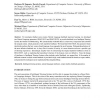Free Online Productivity Tools
i2Speak
i2Symbol
i2OCR
iTex2Img
iWeb2Print
iWeb2Shot
i2Type
iPdf2Split
iPdf2Merge
i2Bopomofo
i2Arabic
i2Style
i2Image
i2PDF
iLatex2Rtf
Sci2ools
AIEDU
2008
2008
Be Brief, And They Shall Learn: Generating Concise Language Feedback for a Computer Tutor
To investigate whether more concise Natural Language feedback improves learning, we developed two Natural Language generators (DIAG-NLP1 and DIAG-NLP2), to provide feedback in an Intelligent Tutoring System that teaches troubleshooting. We systematically evaluated them in a three way comparison that included the original system, which generates overly repetitive feedback. We found that DIAG-NLP2, the generator which intuitively produces the best, corpus-based language, does engender the most learning. Distinguishing features of the more effective feedback are: it obeys Grice's maxim of brevity, it is more directive and uses a specific type of referring expressions. Interestingly, simpler ways of restructuring the original repetitive feedback as done in DIAG-NLP1, such as exploiting the hierarchical structure of the domain, were not effective. Since the design of interfaces to Intelligent Tutoring Systems often includes verbal feedback, we suggest that: if the number of different c...
| Added | 24 Jan 2011 |
| Updated | 24 Jan 2011 |
| Type | Journal |
| Year | 2008 |
| Where | AIEDU |
| Authors | Barbara Di Eugenio, Davide Fossati, Susan M. Haller, Dan Yu, Michael Glass |
Comments (0)

